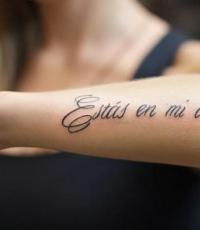The role of the verb in the sentence. Syntactic role of parts of speech Meaning of reflexive verbs
A verb is a part of speech that combines words that denote an action that takes place in the present, past or future tense, as well as the state of an object. Verbs answer the questions: What to do? What to do?
Let's look at the sentence and define the verb in it.In the evening, the weather became noisy: the fast river was agitated, the wind pounded on the windows, the storm began to howl.Words - verbs in this sentence - rustled, pounded, worried, began to howl.
These verbs indicate to us the action that took place with the objects related to the noun. The weather (what did you do?) made a noise, the river (what did you do?) worried, the wind (what did you do?) knocked, the storm (what did you do?) began to howl.
Verb changes
Denoting an action, the verb can also indicate the time when this action is performed. Verbs have three tenses: present, future, past. For example: I am sitting (present tense), sat (past tense) and will sit (future tense).
In verbs, there are also three types of persons: 1st, 2nd and 3rd, and two numbers: plural and singular. Examples:
I'm sitting (1st person singular), knocking (1st person plural)
You sit (2nd person singular), sit (2nd person plural)
Sitting (1st person singular), sitting (3rd person plural)
Verbs that are in the past tense do not have personal endings, and their face is expressed using personal pronouns. For example: I was sitting, you were sitting, he was sitting.
By gender and number, the verb changes in the past tense. For example: mom was sitting (feminine), dad was sitting (masculine), something creaked (neuter). The process of changing a verb in tenses, persons and numbers is called verb conjugation.
The role of verbs in a sentence
Usually in a sentence, the verb acts as a predicate. The verb predicate denotes the state of the object or the action of the object, which in this sentence is the subject. The verb - the predicate agrees with the subject in person and number, in the past tense - in gender and number.
For example: We rush into battle. In this sentence, the verb is the predicate "rush" agrees with the subject word "we" in number and person. The horse ran along the country road. Predicate "ran" agrees with the subject "horse" in number and gender, as it is in the past tense.
Verb tenses
As we already know, verbs change with tenses. The present tense of verbs denotes an action that occurs simultaneously with speech. For example: The wind drives blue clouds in the sky.
Also, the verb in the present tense denotes the state or action of an object that happens to it constantly. For example: People breathe with lungs. Russia is washed by the waters of two oceans.
Past tense verbs indicate an action that is before the moment of speech. For example: The troops of the prince defeated the enemy army of the Mongol-Tatars.
The future tense of verbs indicates the action that will take place after the moment of speech. For example: Each of us will defend our land.
Teacher: Bogdanova S.A.
RUSSIAN LANGUAGE, 4th grade.
Topic: THE ROLE OF THE VERB IN A SENTENCE.
Goals: expand and clarify ideas about the syntactic role of the verb; to form the ability to accurately use verbs in speech; develop creative thinking; develop interest in the native language.
DURING THE CLASSES.
I Organizing time.
II Message about the topic and purpose of the lesson.
What are objects without me?
Only names. And I'll come-
Everything will come into play.
A rocket is flying
People build buildings
gardens bloom,
And bread grows in the fields.
What part of speech is this poem about?
Reading by the teacher of the epigraph written on the blackboard:
"The verb is the most fire-breathing, the most lively part of speech."
A. Yugov.
The theme of our lesson: "The role of the verb in the sentence." Purpose: on the basis of practical activities to determine the role of the verb in our speech.
III . A moment of cleansing.
The sentence is written in calligraphy on the blackboard:
Lera saw a real fox in the forest.
To guess the letter of a minute of calligraphy, we play "Pentagon".
1. This is a consonant letter.
2. It denotes a sonorous sound.
3. The sound is sonorous.
4. It is a suffix - an indicator of the past tense of verbs.
5. In this sentence, it occurs 4 times.
The task:
The letter of the letter is 1 line, the letter of the sentence is the 2nd line.
IV .Repetition about the verb.
1. Game "Domino - verb".
2Full analysis of the sentence recorded at the minute of calligraphy.
V .Reading the essay "The Tale of the City of Glagolsk and Its Glorious Inhabitants".
During flights to the planet Morphology, we studied the residents of the city of Glagolsk for many lessons in a row, then each of you wrote a fairy tale report. Today we will hear the best work.
Tale of the city of Glagolsk and its inhabitants.
Not in a faraway kingdom, not in a faraway state, but on the planet Morphology stands the glorious city of Glagolsk.
In the center of the city there is a palace in which two brother rulers live. One of them is called the Perfect, and the other is the Imperfect, and their surname is the Infinitives.
There are several streets with interesting names in the city: Past Tense Street, Present Tense Street, Future Tense Street. Very interesting doors in the houses on the street of the past tense - they all look like the letter L.
The inhabitants of this city are the most mobile and hospitable. They are doing something all the time. During the day on the streets of the city, everyone is going somewhere, running, driving, flying. Silence pervades the city at night. And the inhabitants sleep peacefully in their sleep and see interesting dreams. In the morning they get up with the sun, do exercises, wash their faces and go to work cheerfully.
VI . Observation of the role of verbs in speech.
Children have cards with texts on their desks. Texts are read aloud by expressive students.
SPRING SPRING.
Everyone is making noise in the forest. And the fontanel murmurs affably. Birds are singing all around. And he smiles and rejoices with them. He sings gentle and kind songs to white snowdrops. he plays with the needles that came to visit him.
Life so and boils in it.
SPRING IN AUTUMN.
Everything was quiet in the forest. The birds have flown away. One spring remained in the same place. Life no longer boiled in him. He was sad. He was crying and moaning softly. Then the spring reached out to the frozen grass. But she turned away from him: she herself was barely breathing ...
It seemed to the spring that everyone rejected him ...
What do the texts have in common?
What is the difference?
What part of speech helped convey the mood of each story?
What is the role of the verb in our speech?
Conclusion: "The verb denotes the actions of objects. But it can also convey mood, feelings."
VII . Writing with a task.
Write down the text "Spring Spring", underline the main members of the sentence, determine the role of the verb in the sentences.
Work in pairs - peer review.
Checking - using signal cards.
VIII . Creative tasks.
1. Find the verbs in the sentences written on the board, determine their morphological features. We complete the task by dividing into three options according to the number of proposals.
In the balala cradle, the riverside rolmo purred.
On a grohorny dygok, zumanol croaks.
Xoro the snake snarls under the carriage.
2. Selection of verbs.
1).Reading the sentence on the board:
Thunder rolls, rumbles, rumbles, grumbles, rumbles.
See how many different actions one item can perform.
Think and write down what actions the fontanel can take.
Spring...
IX . Outcome.
Let's go back to the epigraph of the lesson. Is Yugin right when he calls the verb the most lively part of speech? Prove it.
X . Reflection.
material for the lesson.
1. Cards "Domino-verb".
2. Handout cards with texts.
3. Signal cards.
4. Map of the planet Morphology.
Preparing for the lesson:
Compositions "The Tale of the city of Glagolsk and its inhabitants" based on the results of "flights" to the 10th planet - the planet Morphology (TRIZ).
Add the end of the verbs, determine the role of the verbs in the sentence. Indicate the time, conjugation of the verbs.
Fishing is a great exercise. You get up early in the morning, exit ... at dawn and step ...
a few kilometers on foot until you reach the river. There is a slight trembling through the body of the run. But now the dawn is rising.
Dewdrops will sparkle, grasshoppers will sparkle, smell ... of porridge. And in the sky of the bay ... a cheerful lark.
I’m used to fishing ... to heat and cold, to rain, to being wet ... through and dry ... in the wind, that the bed is ... grass, and the roof is the starry sky. Nature is open on fishing. ..sya in front of a man in all its beauty, diversity and power. View..., feeling... beauty and being charged... with mighty energy for the whole day.
The oldest harp found during excavations was made by a real master.
Morphological analysis of the word- analysis of the word by significant morphological units (morphemes). For example, when analyzing a noun, you need to specify: its initial form, whether it is proper or common noun; concrete, abstract, material or collective; as well as gender, number, animation, declension, number, case and syntactic role in this sentence.
Sample morphological analysis verb: danced - verb, dance nesov. view, I ref., transitive, non-ascending, express. incl., past time, unit h, husband. p., (boy) danced (underline below with two lines) - a simple verbal predicate.
Give examples of sentences in which nouns are used that have only the singular or plural form. 6. Which membersCan sentences be nouns? Show with examples. 7. Name the constants and fickle signs verb. 8. What role do verbs play in a sentence in speech? 9. What groups are the service parts of speech divided into? What is their role in the proposal? Show with examples. 10. What are the names of large groups of words that have a common grammatical meaning (example, adjective, sign of adjective, etc.), change and form in the same way and act as the same members of the sentence?
Write 3 sentences with the indicative mood of the verb, 3 sentences with the conditional mood and 3 sentences with the imperative moodverbs.
Just to get 9 smart and large (medium) proposals))) Please))
5. write out the verbsperfect look.
1) Droplets rang from the roofs. 2) From hillocks
noisy streams ran. 3) Pure snow waters became cloudy.
rain m snowdrifts. 5) Water runs under the snow, and under the bark of birches and maples secretly moved juice. 6) Straighten and twist into a patterned
ligature spreading branches.
6. Select and write down the aspect pair for the verbs from the sentence 4.
7. Determine the topic and idea of the text. Write it down.
8. Title the text.
9. Tell me about your observations for
the onset of spring. (5-6 sentences).
To use the preview of presentations, create an account for yourself ( account) Google and sign in: https://accounts.google.com
Slides captions:
Presentation THE ROLE OF VERBS IN SPEECH, IN A SENTENCE. GRAMMATICAL FEATURES OF THE VERB. Prepared by: Kokhan I.F., teacher primary school MBOU secondary school No. 1 of Surazh
The motto of the lesson: “Learn, be smart, be more active and open the way to knowledge!”
"The word is more precious than diamonds, pearls and gold." K.D.Ushinsky.
Lesson topic Verb. The role of verbs in a sentence, in speech.
Lesson goals. Learn the origin of the word verb. Identify the semantic load of verbs in the text. Generalize and classify verbs according to grammatical features.
Rules for working in groups. Together it's not difficult, Together it's not crowded, Together it's easy And it's always interesting.
The verb is an independent part of speech that denotes the action of an object and answers the questions what to do, what to do? The verb changes in tense, person and number. In a sentence, it is the main member of the sentence - the predicate.
Text plan.
Work in pairs:
Self-test. The golden stars dozed off, The mirror of the backwater trembled. The light glimmers on the backwaters of the river And blushes the grid of the sky. Sleepy birch trees smiled, Silk braids tousled. Green earrings rustle, And silver braids burn. Overgrown nettles by the wattle fence Dressed up in bright mother-of-pearl And, swaying, whispers playfully: "Good morning!"
independent denotes questions role not time l, gender person, number
B. Pasternak said: "Live, think, feel, love, make discoveries."
Homework. Exercise 7, page 109 Red, blue task cards 1. Green cards - task 1.2
Today at the lesson I learned, discovered ... I learned ... I can praise myself and my classmates for ... I
Sources: http://i004.radikal.ru/1103/d6/6c9527db1fac.png frame http://i070.radikal.ru/1005/25/c106eb1c9e19.png owl among books http://web-workspace.ru/ uploads/posts/2011-04/1302382775_5tu9lsencqknrmo.jpeg marker http://forum.materinstvo.ru/uploads/1254137775/post-35249-1254217825_thumb.png flowers, globe, etc. (working slide)
Preview:
Lesson topic: The role of verbs in a sentence, in speech.Grammatical features of the verb.
Goals :
knowledge:
know the origin of the word “verb”, know the indefinite form of the verb, its features and suffixes, know the role of the verb in the text, sentence, know the spelling rule NOT with verbs, know the semantic meaning of the particle NOT for verbs.
understanding:
find verbs in the text, explain the meaning of the verb in the sentence, in the text, explain the role of the verb in the sentence, in the text, understand the name of the indefinite form of the verb, tell what is known about the verb according to the proposed plan.
application:
write sentences using the spelling rule NOT with verbs, put the verb in an indefinite form, highlight the suffix.
analysis:
analyze the text from the point of view of the semantic role of verbs, analyze the text from the point of view of the semantic role of verbs with the particle NOT.
synthesis:
write a story according to the plan "What do we know about the verb"
Planned results: subject and meta-subject (UUD), the formation of which is aimed at the work in this lesson.
Subject:
- systematize knowledge about the verb as a part of speech;
- know the origin of the word “verb”, know the indefinite form of the verb, its features and suffixes, know the role of the verb in the text, sentence, know the spelling rule NOT with verbs, know the semantic meaning of the particle NOT for verbs
- mastering the norms of the Russian literary language, developing the ability to consciously use verbs in speech.
- the ability to control one's actions, to check what was said and written.
Metasubject (UUD)
Cognitive: general educational (ability to compare), establish analogies; generalize, teach to highlight the essential features of the verb.
Regulatory: the ability to accept and maintain the learning goal and task, planning, monitoring and evaluating one's actions.
Communicative:
- take into account different opinions, the ability to cooperate;
- be able to formulate their own opinion and position;
- build a monologue statement, own a dialogic form of speech.
Personal:
- development of independence;
- develop attention, perception, the ability to observe and draw conclusions.
During the classes
1.Motivation.
We have guests today, greet them.(Slide1.)
The long-awaited spring has arrived. March is the beginning of the awakening of nature. More and more the gentle sun pleases us. Today it shone in our class. Smile at each other, smile at me. After all, a kind smile strengthens health, cheers up, and encourages communication. And today we will have a difficult lesson, and the lesson is research.
What do you think the word meansresearch? (study, learn something new).
Read the motto of our lesson:(Slide 2)
“Learn, be smart, be more active and open the way to knowledge!”
Today in the lesson you need:
Think, reason, speak, think.
What is given to a person to convey his thoughts, feelings, truth and inspiration to other people? (word)
Russian teacher K.D.Ushinsky wrote:(Slide 3)
"The word is more precious than diamonds, pearls and gold."
How do you understand this statement?
(There are a huge number of words in the Russian language with which we can freely speak and write. A word can encourage, support, or even kill.)
2.Updating knowledge.
1. Language warm-up.
words on the board
According to the sun, clear, radiant, sky, weight.
Make up a sentence using the words.
Was it easy to make a proposal? Why?
What part of speech is missing in this sentence?
Choose the verb that makes sense.
Write down the proposal.
A radiant sun floats merrily across a clear sky.
Explain spelling.
Perform a syntactic analysis of this sentence.
Break it down into parts of speech.
3. Determining the topic of the lesson and goals.
1) Introduction to the section.
Once one part of the speech was asked to answer the questions of the questionnaire. Listen to the questions and answers and guess what part of the speech the conversation will be about.
1) What do you like the most?
I love to act.
2) What do you dislike the most?
I do not like prepositions and the well-known particle.
3) What would you wish the guys?
To Russian all the guys
Knew for five
In writing and speaking
We were used.
What part of speech was suggested to answer the questions of the questionnaire?
Verb?
That's right, it's a verb part of speech.
2) Definition of the topic of the lesson.
Determine the topic of our lesson.
Verb. The role of the verb in a sentence, in speech.(SLIDE4)
Let's define the objectives of our lesson.(Slide 5)
Do you think there are questions about the verb that we don't know how to answer?
Then I have a question!
What does the word verb mean?
We will find the answer to this question in the text that lies before you. Read.
The verb is an unusual part of speech. It is unique in its name.
The word verb is borrowed from the Old Slavonic language, where it had the meaning "word, speech", "verb" meant to speak ...
Fedor Ivanovich Buslaev, a well-known Russian linguist, explains this term in this way: “The verb is an old saying and means the same as the word: therefore, the verb is everything that says, that says about the subject; is that why the verb is a predicate?
The word verb gradually lost its old meaning. Now it is the name of one part of speech.
So why did this part of speech get such a name?
In modern Russian there is a wordrant.
Try to guess what it means?
Let's check the explanatory dictionary.
Choose keywords that relate to the topic of our lesson.
Subject, part of speech, what, action of the subject, what to do ?, who ?, what to do, a sign of the subject
Use keywords to define the verb.
To test our knowledge of the verb, we will conduct research work in groups.
Let's remember the rules of working in groups.(Slide6)
Each group has a task. Run it and draw a conclusion.
Task 1 group.
Divide the words into three groups and draw a conclusion.
She came, she goes, she comes, she blooms, they whistle, they flow.
Task 2 group.
Divide the words into groups. Make a conclusion.
I go, you come, they whistle, flow, bloom, sing,
Task 3 group.
Divide the verbs into 2 groups. Make a conclusion.
Go, look, sing, go, look, sing
Task 4 group.
Divide the words into 3 groups, draw a conclusion.
Played, ran, played, ran, played, ran
Task 5 group.
Open the brackets. Make a conclusion.
(didn’t) take, (didn’t) eat, (didn’t) bring, (didn’t) know how, (didn’t) bloom
Task 6 group.
Highlight the grammatical basis in the sentence. Make a conclusion.
Spring streams murmur merrily along the roads. The agile sparrows chirped merrily.
rule on the slide.
The verb is an independent part of speech that denotes the action of an object, answers the questions what to do? what to do?.
The verb changes in tense, person and number.
In a sentence, it is the main member of the sentence - the predicate.
What text is this? (scientific and educational)
How many parts are in the text?
Ask questions for each part.
We've got a plan.
Plan.
1. What is a verb?
2. How does the verb change?
3. What is the verb in the sentence?
Retelling according to plan
Fizminutka.
3. Application of knowledge in practice.
4) The role of the verb in speech, sentence.
And now, guys, we will find out what role verbs play in speech.
What can be discussed in the text to which the illustration is made? (Slide 7)
Who recognized this work?
Let's do exercise 231. Read the task for this exercise?
Work in pairs.
What verbs did you underline?
What is this text? (narrative text)
Why? (The keywords are verbs.)
What is the meaning of the verbs in this text?
(Reader's perception moves from action to action.)
Let's see with what parts of speech S. Yesenin paints a picture of a summer morning in the poem "Good morning!".(Slide 8)
Read the poem in exercise 232
With the help of verbs.
What is the meaning of these verbs? (portable)
How do they characterize inanimate objects? (as living beings)
What is this technique called in the literature? (personification)
We carry out this task in rows.
1 row works with 1 stanza, 2 row -2 stanza, 3 row - 3 stanza.
Write down, underline the grammatical basis.
Self test
What parts of a sentence are verbs?
Explain what connects the union and in the sentence, what the comma separates in sentences
Differentiated work on cards.
Everyone has cards of a certain color on their desks. Complete the task.
1card.
Verbs have tense, person and number.
The March sun is getting hotter. Snow melts under its rays. Crystal drops rang under the windows to different voices. Soon streams will run along the roads.
2card.
Insert suitable verbs.
Everything is brighter ... .... the March sun. Under its rays…..snow. ...... under the windows for different voices crystal drops. Soon on the roads ... .. streams.
3 card
Use verbs to write a story about spring.
Warms, melts, rang, run.
5.To r lesson.
Amazing part of speech verb! Use the key words to write a story about the verb.
Independent
Denotes
Questions
Role
Not
Time
L, genus
face and number
B. Pasternak said: “Live, think, feel, love, commit
discoveries". (Slide 9)
What part of speech did Pasternak use in his statement?
What do you think, did we make all the discoveries about the verb today in the lesson?
Of course not, because the verb is the most fire-breathing, the most lively part of speech.
And we will continue to get acquainted with him in the next lesson.
6. Homework.(Slide10)
Exercise 7, p. 109 (differentiated)
7. Reflection.
You did a great job in the lesson, and in memory of him I give you leaves, because spring is already on the threshold, and if everything worked out for you, you can attach your leaves to a tree called a verb.
A sentence is one of the basic units of syntax. It is a complete thought and can consist of one or more words. From a grammatical point of view, the sentence has members - the main ones (subject and predicate), as well as secondary ones (what is the syntactic role of this or that part of speech in the sentence? We will try to understand this issue below: we will consider only
The syntactic role of the noun
As a rule, it acts as the main member of a sentence or addition. But the peculiarity of this part of speech is that it can become any member of the sentence. In their basic role, nouns can be defined, for example, by adjectives, pronouns, participles, with agreement in categories such as gender, number, and case. A noun can also form syntactic constructions with verbs, adverbs and predicative words.
Syntactic role of adjective
The most common role of an adjective in a sentence is the agreed definition, but it is not the only one. An adjective can also act as a subject or nominal part of a compound predicate. It is typical for adjectives in short form to act only as a predicate.
The syntactic role of the adverb
The usual role of the adverb is the circumstance - the mode of action, time, place, cause, purpose, measure and degree. However, sometimes it can be predicate. There is also a separate group of adverbs that play the role of allied words in a sentence.

The syntactic role of the verb
The verb usually acts as a predicate. The infinitive (if you don't remember - it can also be part of a compound predicate, or be a subject, object, definition, circumstance.
The syntactic role of the participle
The participle has the same grammatical properties as the adjective, therefore, in a sentence it often acts as an agreed definition. However, its affinity with the verb also allows the participle in some cases to be the nominal part of the compound predicate, but this is typical only for short forms. In addition, the participle with dependent words forms the so-called which, being an indivisible construction, can be almost any minor member.
The syntactic role of the gerund
The participle in the sentence is only a circumstance. However, in the composition, it may become another minor member of the proposal, but it is important to remember that the turnover is considered as a whole.

The syntactic role of the pronoun
The role of the pronoun directly depends on which category it belongs to. Since the variety of pronouns gives them wide possibilities, they can act as a subject, predicate, definition and object - depending on the context.
The syntactic role of the numeral
Numerals in a sentence can be both subject and predicate, as well as a definition or adverb of time. As you can see, nothing complicated.





